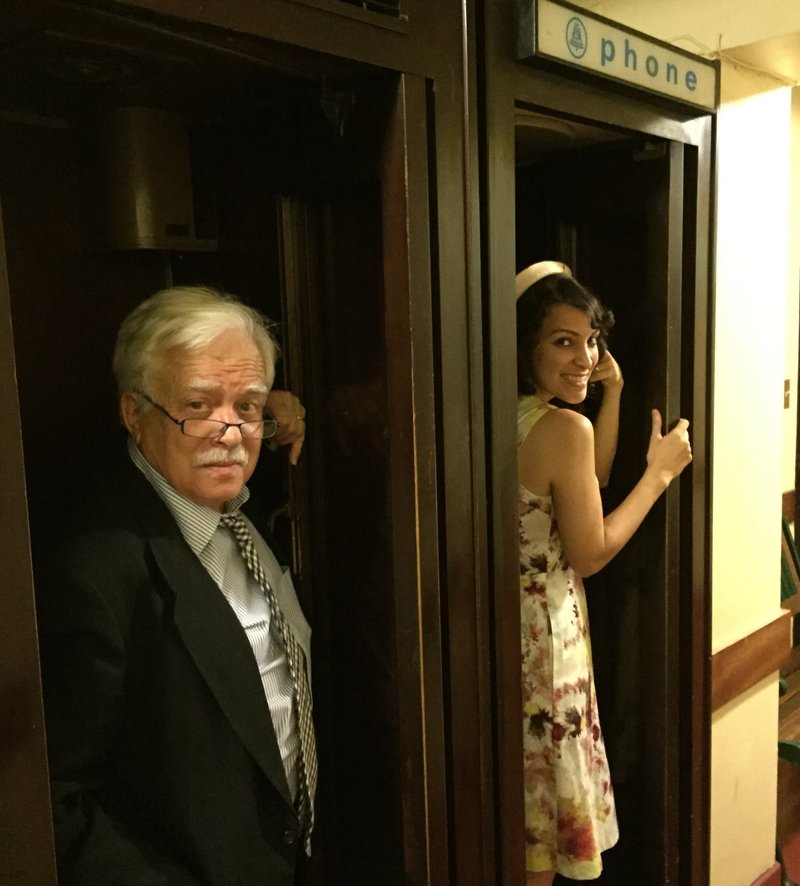Reflections: Gaby Moreno & Van Dyke Parks

The cross-generational collaborators turn in a lushly realized blend of subtle protest music and vintage Spanish-language hits.
Gaby Moreno was crooning Neil Young’s “Heart of Gold” at Largo in 2008 when Van Dyke Parks strolled into the Los Angeles nightclub. The veteran producer/arranger/ musician/songwriter was struck by the Guatemalan singer’s voice and, soon after, the pair joined bassist David Piltch for a rendition of “Aquellos Ojos Verdes” (Those Green Eyes), a Latin American classic composed by Cuban-born musicians Nilo Menéndez and Adolfo Utrera and released in 1929. Parks first sang the tune in 1962 while performing in Southern California coffeehouses as half of the Steeltown Two with his older brother, Carson, who is best known as the composer of the Frank and Nancy Sinatra hit “Something Stupid.”
Now, Moreno and Parks have crafted a stellar response to our miserable new era of brutal xenophobia on ¡Spangled!, a lushly realized blend of subtle protest music and vintage Spanish-language hits.
Moreno, who moved to Los Angeles as a teenager nearly 20 years ago to fulfill her singer-songwriter dreams, is intimately familiar with the immigrant experience. The celebrated composer and arranger Parks, meanwhile, has been exploring America and its relationship to the rest of the world since the late-‘60s on albums like Song Cycle, Discover America and Tokyo Rose.
“¡Spangled! could not be more timely,” says Parks, 76, from his home in Los Angeles. Fellow Angeleno Moreno, 37, concurred in a separate conversation: “We want to put out the message that we are in solidarity with all immigrants.”
After bonding over their mutual adoration of Spanish-language music, Parks and Moreno began the decade-long alliance that resulted in ¡Spangled! Around the same time, Moreno wrote her first original, “Ave Que Emigra” (Bird That Migrates), which appears on Illustrated Songs. The pair began trading songs, with Parks creating MIDI orchestrations.
Before that time, Moreno’s only familiarity with Parks’ discography was his string arrangement for Fiona Apple’s “Never Is a Promise,” a personal favorite. But, it turned out that at least one of his projects had already made a big impression on her. “He also wrote the songs for The Brave Little Toaster, which was one of my favorite movies growing up,” she says. “I couldn’t believe it. I was singing his songs as a kid!”
On July 4, 2010, Parks and Moreno performed several of the pieces that would end up on ¡Spangled! with the Danish Radio Youth Orchestra as part of the Roskilde Festival in Denmark. Delighted with the results, they continued working on the album even as other projects temporarily took precedence. Moreno released several albums of what she calls “Spanglish folk-soul,” joined a traveling David Bowie revue and became a regular on Chris Thile’s Live From Here radio show. She also found a cult following as fans and fellow musicians slowly realized she co-wrote the theme song for Parks and Recreation.
“I had no idea that Van Dyke had submitted a theme as well,” she says of the latter. “But I immediately got a call from him congratulating me when it was announced.”
“I thought, ‘Parks,’ I should do that,” laughs Parks. “I was the last contestant, the one who lost the job.”
Thank Parks and Recreation for helping Moreno fund most of ¡Spangled! herself. As complexly orchestrated as it is, however, hiring and rehearsing an entire orchestra was prohibitively expensive, so strings, horns, marimba, harp, vocals and everything else were recorded more or less independently. And, now, ¡Spangled! is slated to receive its first full orchestral interpretation when Moreno performs it on Dec. 2 in New York’s Merkin Hall.
The recording opens dramatically with a take on Ry Cooder, John Hiatt and Jim Dickinson’s oft-covered “Across the Borderline.” In the Moreno-Parks version, strings and voices pan majestically across a Western landscape, with Moreno multitracked into a female chorus reminiscent of the Optimistic Voices welcoming Dorothy into the Emerald City. “I felt like just another instrument in the orchestra throughout the album,” she says. “At first, it was a challenge. He wrote harmonies I wasn’t used to hearing.”
Parks considers ¡Spangled! to be an album of “retroromantic Panamericana” and hopes the LP evokes a idealized slice of the 20th century preceding the arrival of the “Ugly American.” The Peruvian waltz “Nube Gris” (Gray Clouds), the Panamanian love song “Historia de un Amor” (A Love Story) and the Venezuelan joropo “Alma Llanera” (Soul of the Plains) are all songs that emigrated from their homelands to become standards across Latin America. Parks’ love of calypso, meanwhile, is reflected in a Technicolor version of Trinidadian star David Rudder’s “The Immigrants,” whose 1998 lyrics about migrants fighting for a better life while building America seem to have anticipated Hamilton.
Moreno contributed “El Sombrerón,” which is based on a Guatemalan folk tale about a little man in a big hat who drives women crazy. “I always thought it would be a quirky and fun story to tell in song,” she explains. “Also, one of the first Guatemalan movies was about El Sombrerón, and my grandfather acted in it, in 1960.” “El Sombrerón,” like the rest of ¡Spangled!, offers listeners a first-class voyage to what Parks sees as a more idealistic, less xenophobic era. “The music reflects that,” he says. “It’s a place to escape to.”
This article originally appeared in the December 2019 issue of Relix. For more features, interviews, album reviews and more subscribe below.




















